Markets
When designing a humanitarian intervention and deciding whether to use CVA, a market analysis should be part of the overall response analysis. Supporting markets to function well has been shown to lead to faster recovery and increased resilience in disaster affected areas.
Many organizations have invested in the development of tools to support market analysis and are considering market-based programming more holistically. This includes interventions that use the market (such as cash transfers to affected populations), as well as interventions that directly support markets (such as conditional grants to traders to get their market back up and running).
Related initiatives
Featured content

Introduction to Market Analysis
Course
This 30 minute online course provides an introduction to the analysis of markets in emergency contexts, with input from some of the world’s leading thinkers on the topic.

A Practical Guide to Market Analysis in Humanitarian response
Course
A three to four hour online course designed to provide future humanitarian market assessment team members with a solid understanding of theory and steps of market assessments so that they can join assessment teams prepared with a basic understanding of what they will be doing and why.
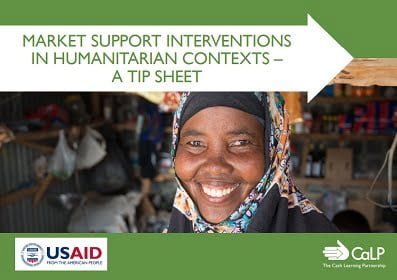
Market Support Interventions in Humanitarian Contexts – a Tip Sheet
Guidelines and Tools
This tip sheet defines what market support programming in humanitarian contexts is, and what it can look like in practice. It enables humanitarian practitioners to systematically consider market support interventions alongside other programme activities. The scope includes support interventions focusing on supply/availability and on demand/access. The tip sheet is based on secondary data...

Market Based Programming (MBP)
Guidelines and Tools
Market Based Programming (MBP) in Oxfam’s work means we always consider existing markets – through assessments, analysis and programming – across all phases of a response and across all technical sectors. You can also watch the videos below which are available in English, Spanish, Arabic and French.
Thematic lead
Latest
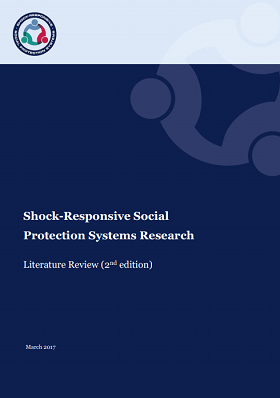
Shock-Responsive Social Protection Systems Research: Literature Review (2nd Edition)
Report
DFID has commissioned research into Shock-Responsive Social Protection systems, to further understand the nature of the interaction between social protection, humanitarian and disaster risk management systems and ways in which long-term social protection systems can be scaled up to provide support in...

Karamoja Market Assessment
Report
A market assessment of the feasibility of cash transfers in the Karamoja region – Executive summary

Checking Back – Using Cash and Vouchers in Somalia: Recommendations from the 2011-12 Somalia Drought Response
Report
This paper brings together recommendations from some of the key reports and evaluations from the 2011 Somalia drought response. The process of preparing this paper involved reviewing 17 reports and identifying five that had recommendations which could be useful for all agencies involved the current...

Multisectoral Basic Needs and Market Assessment Moyo Uganda
Report
A multisectoral basic needs and market assessment done in Palorinya settlement and the host communities within Moyo district. Focuses are on basic needs and cash feasibility, the education system gaps, the firewood issues and access to loans and credit.
Data were gathered in December 2017, with...

Using Cash and Vouchers in Somalia in 2017: The Need to Build on Learning from the 2011-12 Somalia Drought Response
Report
During the 2011-12 drought response in Somalia, cash and vouchers were distributed at scale – a response that was unusual in such a context at that time. In 2017 cash is accepted as highly appropriate and is a major part of response plans. While it may not always be possible to apply all best...
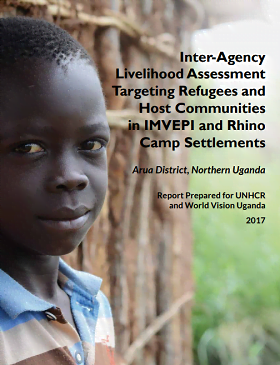
Inter-Agency Livelihood Assessment Targeting Refugees and Host Communities in IMVEPI and Rhino Camp Settlements Arua District, Northern Uganda
Case Study
This inter-agency needs assessment by World Vision Uganda (WVU), UNHCR and Caritas was conducted in two settlement areas of Rhino and Imvepi located in the West Nile Region of Uganda. The Imvepi settlement is the most recently opened area (February 2017) for resettlement and located about 72km east of the...

Rapid Market Assessment Sofala Province, Mozambique
Report
The joint TDY between USAID/FFP and FEWS NET Mozambique to Sofala Province, Mozambique had two distinct objectives:
1) Assess current food security and market conditions including:
a) Scale of humanitarian assistance relative to needs
b) Understand maize market structure, conduct and performance
c)...

Collecting Prices for Food Security Programming
Guidelines and Tools
As a contribution towards standardizing price data collection, this paper aims to explore the core issues related to setting up a price monitoring system, also in countries where no such system currently exists. It describes the factors a country office needs to consider when designing such a system,...

Rapid Assessment for market report : West Kenya and Informal settlements in Kenya.
Report
Two locations namely Mathare and Kibera slums in Nairobi as well as Kisumu, Migori and Homabay counties in West Kenya were affected by post election skirmishes after the Kenya General Elections of 8th August 2017. In September 2017 Kenya Red Cross conducted a post crisis market assessment to establish how...
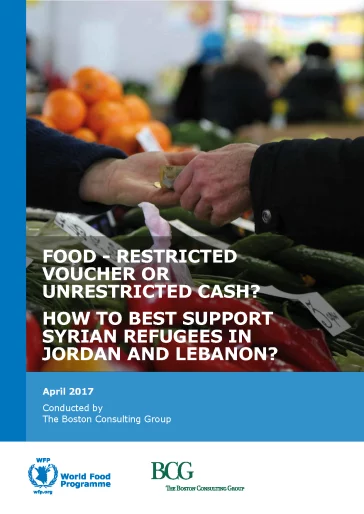
Food – Restricted Voucher or Unrestricted Voucher Cash? How to Best Support Syrian Refugees in Jordan and Lebanon?
Report
The World Food Programme (WFP) plays a pivotal role in the food security of Syrian refugees within the Syria +5 region. WFP periodically reviews its operational approach, so it is timely to consider what the best modality for the next phase of the response might be, including the pros and cons of...
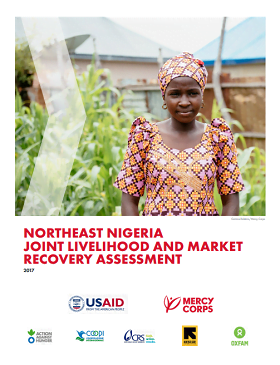
Northeast Nigeria joint livelihoods and market recovery assessment
Report
Mercy Corps Nigeria, in conjunction with Action Against Hunger, Cooperazione Internazionale, Catholic Relief Services, the International Rescue Committee and Oxfam undertook the assessment across the three most affected states in Northeast Nigeria; Adamawa, Borno and Yobe, to better understand...

Multi-sector Market Assessment: Companion Guide and Toolkit
Guidelines and Tools
The Multi-sector Market Assessment: Companion Guide and Toolkit provides step-by-step guidance and ready-to-use tools to enable non-specialist staff to conduct market assessments and undertake market monitoring. The purpose of this Companion Guide and Toolkit is to enable Multi-Functional Teams to...

Monitoring 4 CTP: Monitoring Guidance for CTP in Emergencies
Guidelines and Tools
This guidance provides a central resource to promote a common understanding of the most important monitoring considerations for humanitarian projects using cash transfer programming (CTP). The primary audience for this guidance is field-level practitioners, from organisations directly involved in the...
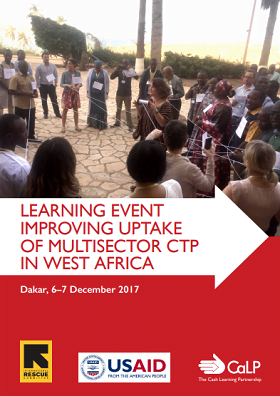
Improving Uptake of Multi-Sector CTP in West Africa: Learning Event Report
Report
In December 2017, the CALP Network and the IRC came together to organize a two-day learning event to align understanding and share experiences of countries working on the definition of Minimum Expenditure Baskets, and to contribute to bridging capacity gaps in Market Analysis, a critical step for CTP...

Feasibility of Multi-purpose Cash Transfers in N’Guigmi
Report
This assessment was conducted by World Vision’s Emergency Program in the Lake Chad Basin. The objective was to: 1) Do a comprehensive needs assessment of the affected populations in the area, 2) Specify the amount of the minimum expenditure basket 3) Evaluate the market capacity and feasibility of...
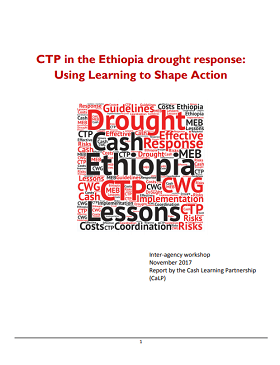
CTP in the Ethiopia Drought Response: Using Learning to Shape Action
Report
This workshop, convened by the CALP Network and the Ethiopia Cash Working Group, reflected on the use of cash transfers in the 2017 drought response. Key findings were: Cash helped address immediate needs and contributed to meeting some of the drought response objectives. There were significant...

Fitting aid to context: community experiences of aid delivery in northern Syria
Report
The ongoing conflict in Syria has left 13.5 million Syrians in need of humanitarian assistance. Several local and international organisations provide aid to northern Syria, but their chosen modalities fail to effectively meet community members’ needs. While aiming to respond to immediate short-term...

Aid in context: the importance of market-based approaches to aid delivery in northern Syria
Report
With the Syrian conflict now in its seventh year, 13.5 million Syrians need humanitarian aid. But aid in northern Syria focuses inflexibly on food kits that are expensive to administer, designed to satisfy short-term needs.
Many people sell their food aid to pay for other urgent needs. This
undermines...

Improving the Uptake of Humanitarian Market Analysis
Guidelines and Tools
Market assessments and market-based programming are now widely considered best practice in humanitarian programming, especially among food security and livelihoods actors. They are embedded in various standard-bearing initiatives, and there are a number of tools for emergency market analysis and...

Interim Guidance Note on Determining Cash Transfers Values for Food Security
Guidelines and Tools
The objective of this guidance note, as laid out in the Terms of Reference, is to: Leverage FSC partners’ knowledge and experience to develop guidance on cash transfer value logic for both unconditional and relevant food security cash for work/assets3 programming. It focusses on acute food insecurity...



